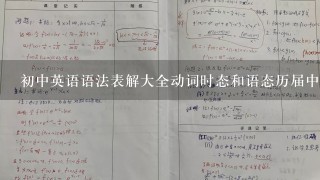初中英语语法表解大全动词时态和语态历届中考单选试题答案,初中英语语法表解大全动词时态和语态历届中考单选试题答案

1、初中英语语法表解大全动词时态和语态历届中考单选试题答案
百度中考语法三剑客,大纲,绝对好东东,视频,练习都有了初中语法。

2、初中英语语法表解大全动词时态和语态历届中考单选试题答案
初中语法,百度 中考语法三剑客,视频,大纲,练习都有了,绝对好东东。

3、初中动词时态与语态详解
参考薄冰英语,或者新东方英语语法书,推荐。

4、星火英语-语法全解 初中版 时态和语态的全部内容
我只有这个,不知道能不能帮上忙 第四章:时态 第一节 一、动词的时态 作谓语的动词发生变化来表示行为,状态发生的时间及进行的情况的各种形式称为时态。英语有两种语态:主动语态和被动语态。时态和语态是英语语法的重要组成部分,也是考试必考的内容之一。从是否跟宾语的角度来看,英语动词可以分为两种,即不及物动词和及物动词。不及物动词没有被动语态。及物动词有两种语态:主动语态和被动语态。任何一个及物动词不是使用主动语态,就是使用被动语态,没有语态的及物动词是不存的。时态测试实际上也同时测试语态。 二、一般时态 一般时态表示现在、过去或将来的动作状态或特征。
1、一般现在时 (1)一般现在时表示没有时限的持久存在的习惯性的动作或状态,或现阶段反复发生的动作或状态,常和副词usually,often, always, sometimes, regularly, near, occasionally, every year等连用。 例:His is always like that. 例:Mr.Smith travels to work by bus every day. 史密斯先生每天乘公共汽车去上班。 (2)在由after, until, befor, once, when, even if ,in case, as long as, as soon as, the moment以及if, unless等引导的时间状语从句或条件状语从句中,通常用一般现在时代替将来时。 例:I will tell him the news as soon as I see him. 我一看见他,就把消息告诉他。 (3)某些表示起始的动词,可用一般现在时表示按规定、计划或安排要发生的动作,这类动词有:be, go, come, start, depart, arrive, begin, leave等。 (4)在由why, what, where, whoever, who, that,as等引导的从句中,也常用一般现在时代替将来时。 例:Tomorrow at this time we’ll give $500 to any one who brings him to justice. 三、一般过去时 (1)表示过去某一特定时间所发生的、已完成的动作或状态,常与表示确切过去时间的词、短语或从句连用。 例:She didn’t look well when I last saw her. 我上次看到她时,她脸色不好。 (2)表示过去习惯性的动作。 例:He always went to class last. 经典练习:
1、If she doesn’t tell him the truth now, he’ll simply keep on asking her until she____. A)does B)has done C)will do D)would do
2、America will never again have as a nation the spirit of adventure as it_____before the West was settled. A)could B)was C)would D)did
3、Carey didn’t go to the party last night because she_____the baby for her sister until 8:30. A)must have looked after B)would have to look after C)had to look after D)should have looked after
4、---Was the driving pleasant when you vacationed in the countryside last summer? ---No,it_____for four days when we arrived, so the roads were very muddy. A)was raining B)would be raining C)have rained D)had been raining 第二节 一、一般将来时 (1)表示将来打算进行或期待发生的动作或状态。 例:I will have eggs and toast for breakfast tomorrow morning. 明天早饭我吃鸡蛋和烤面包。 (2)几种替代形式: 1)be going to +v在口语中广泛使用,表示准备做或即将发生的事情。 例:I’m going to buy a house when we’ve saved enough money. 2)be to +v表示计划安排将要做的事。 例:There is to be a rail strike on July 18th. 3)be about to+v表示即将发生的事情。 例:We are about to start. 4)be due to+v表示预先确定了的、必定要发生的事。 例:His book is due to be published in October. 他的书预定10月份出版。 5)be on the point/verge of +(v-ing)sth.强调即将发生的某种事态。 例:The country is on the verge of civil war. 这个国家就要打内战了。 二、进行时态 进行时态表示现在、过去或将来一个时间点或一个时间段正在进行的动作。
1、现在进行时 (1)表示瑞正在进行的动作,常与now, right now, at the moment, at present等连用。 例:The telephone is ringing, would you answer it, please? 电话铃响了,请你接一下,好吗? 表示现阶段经常发生的动作,常与always, continually, constantly等连用。 例:John is always coming late. 约翰总是迟到。 经典练习:
1、Turn on the television or open a magazine and you_____advertisements showing happy,balanced families. A)are often seeing B)often see C)will often see D)have often seen
2、Now that we_____so far, we may as well go all the way. A)come B)are coming C)had come D)have come
3、Ever since the family moved to the suburbs last year, they _____better health. A)could have enjoyed B)have been enjoying C)had enjoyed D)are enjoying
4、Whenever we visited them, they_____television. A)have watched B)had watcded C)watch D)were watching 第三节 一、现在进行时 (3)表示根据计划或安排在最近要进行的事情。具有这种语法功能的动词仅限于过渡性动词,即表示从一个状态或位置转移到另一个状态或位置上去的动词。常用的有;go, come, leave, start, arrive,return等。 例:They are leaving for Hongkong next monty. 他们下个月去香港。 (4)有些动词一般不能使用进行时,这是一类表示“感觉”、“感情”、“存在”、“从属”等的动词。如:see, hear, smell, taste, feel, notice, look, appear(表示感觉的动词);hate, love, fear, like, want, wish, prefer, refuse, forgive(表示感情的动词);be, exist, remain, stay, obtain(表示存在状态的动词);have, possess, own, contain, belong, consist of , form(表示占有与从属的动词);understand, know, belive, think, doubt, forget, remember(表示思考、理解的动词)。但是如果它们词义改变,有时也可使用进行时态。 例:Jane looks pale.What’s wrong with him? 珍妮看上去脸色苍白,她怎么了?(look在此为联系动词) 例:Jane is looking for his books. 珍妮正在寻找她的书。(look在此为实义动词) 二、过去进行时 过去进行时表示一个过去的动作发生时或发生后,另一个过去的动作正在进行,或表示过去正在进行,或表示过去反复的习惯,常与always, continually, constantly等词连用。 例:When I called him, he was having dinner. 例:When I visited him, he was always writing at the desk. 每次我去看望他,他总是在桌旁写着什么。 经典练习:
1、When Mr. Delay got home after a day’s exhausting work, his wife and children_____. A)were sleeping B)was sleeping C)slept D)have been sleeping
2、As we were cleaning the office, he_____here to work. A)was coming B)came C)comes D)is coming
3、We have done things we ought not to have done and_____undone things we ought to have done. A)leaving B)left C)will leave D)leave
4、The goods_____when we arrived at the airport. A)were just unloading B)had just unloaded C)were just being unloaded. D)were just been unloaded 第四节
1、将来进行时 将来进行时主要表示将来某一时刻正在进行的动作,或表示要在将来某一时刻开始,并继续下去的动作。 例1:What will you be doing this time tomorrow? 你明天这个时候将做什么? 例2:My brother’ll have to take care of you.I’ll call him today and he痩l be expecting you. 我的兄弟一定会关照你的。我今天给他打个电话,然后他就会等你去。 2.完成进行时 完成进行时是完成时的强调形式。 3.完成时态 完成时态表示已完成或从事的动作,它可分为: 1) 现在完成时用来表示对目前状况仍有影响的刚刚完成的动作(常与yet,already,just连用),或者过去某一时该发生的,持续到现在的情况,甚至还可能继续下去(常与for,since连用)。 例1:He has just come back from town. 他刚从城里回来。 例2.We’ve known each other since childhood.我们从童年时代起就彼此认识了。 注:现在完成时与与一般过去时的区别:现在完成时强调过去发生的动作与现在的关系,如所发生的结果、影响等;而一般过去时只表示动作发生在过去表示某一时刻,不表示与现在的关系。
1、There seemed little hope that the explorer,____in the tropical forest,would find his way though it. ***.to be deserted b.to have been deswrted c.having deserted d.having been deserted
2、I appreciated____the opportunity to study abroad two years ago. a.having been given b.to have been givern c.having given ***.to have given
3、Nowhere in nature is aluminum found free,owing to its always____with other elements,most commonly with oxygen. a.combined b.having combined c.combine d.being combined 第五节
1、完成时态可用在下列结构中: This(That,it)is(was )the first(second….)time+定语从句: This(That,It)is(was) the only (last)+名词+定语从句;This (This,It)is (was)+形容词最高级+名词+定语从句。如果主句的谓语动词是一般将来时, 从句的谓语动词动词通常用现在完成时;如果主句谓语动词是一般过去时,从句的谓语动词通常用过去完成时。 例1:This is the first time(that )I’ve drunk Californian champagne. 这是我第一次喝加利福尼亚香槟酒。 例2:There was a knock at the ***.It was the second time someone had interrupted me that evening. 有人敲门,这是当天晚上第二次有人打扰我了。 2.过去完成时 (1)表示过去某时间前已经发生的动作或情况,这个过去的时间可以用by, before等介词短语或一个时间短语从句来表示;或者表示一个动作在另一个过去动作之前已经完成。 例1:When we got there the basketball match had already started. 我们到那里时,篮球赛已经开始了。 例2:I had finished my homework before supper. 我在晚饭前已经把作业做完了。
1、By the end of last year, I ______ in this university for ten years. a.had work b.was work c.was working d.worked
2、I decided to go to the library as soon as I ____. a.Finish what I did b.Finished I did c.Would finish what I was doing d.Finished what I was doing 第六节 1.动词expect, hope, mean, intend, plan, suppose, wish, want, desire等用过去完成时,表示过去的希望,预期,意图或愿望等没有实现。 例1:I had meant to leave to on Monday, but have stayed on. 我本来打算星期一离开,但最终还是继续留下来了。 另外两种表示“过去想做而未做的事”的表达方式是: (1)was / were+ to have done sth. 例1:We were to have come yesterday, but we couldn’t. 我们本想昨天来的,但我们来不了。 (2)intended (expected, hoped, meant, planned, supposed, wished, wanted, desired)+ to have done sth. 例:1I mean to have told you about it, but I forgot to do so. 我本想告诉你这件事,但我忘掉了。
2、过去完成时常用于以下固定句型: (1)hardly / scarcely / barely+过去完成时(倒装形式)+when +过去时 例1:Hardly had I arrived when I had a new problem to cope with. 我一到达就有新问题要处理。 (2) no sooner+过去完成时(倒装形式)+than +过去时。 例1:No sooner had the words been spoken than he realized that he should have remained silent. 这话刚说出口,他就意识到他本该保持沉默的。 (3)by(the end of )+过去时间,主句中谓语动词用过去完成时。 例1:By the end of that year Henry had collected more than a thousand foreign stamps. 到那年年底,亨利已收集了一千多张外国邮票。
1、Before the first non?stop flight made in1949, it____necessary for all planes to land for refueling. a.would be b.has been c.had been d.would have been
2、Until then, his family____from him for six month.?( CET-4 1997, 1)? A) didn't hear B) hasn't been hearing C) hasn't heard D) hadn't heard。

5、哪位哥哥姐姐有初中的英语语法关于那些时态,什么语态,还有那些从句?希望每个有两个例句
英语时态总共十六种: 一般现在时、现在进行时、现在完成时、现在完成进行时、一般过去时、过去进行时、过去完成时、过去完成进行时、一般将来时、将来进行时、将来完成时、将来完成进行时、一般过去将来时、过去将来进行时、过去将来完成时、过去将来完成进行时。 只给你举例常用常考的时态。 一、将来进行时(计划中的事):
1、 i won't see him while i'm in Shanghai.
2、 i won't be seeing him while i'm in Shanghai. 注意两句意思的不同,1:我去上海的时候不回去看他。
2、 我去上海的时候见不到他。 二、将来完成时(持续到将来): i'll have 1000$ by the end of the year. 到年底的时候我就存够一千块钱了。 将来完成进行时(在将来的某个时间,动作进行了多久): i'll have been working here for 20 years with one more month. 再过一个月我在这儿就工作20年了。 三、过去进行时(过去某个动作正在进行): it was snowing all night. 下了一整晚的雪。(现在还没停) 如果某个动作没有完成,可以用一般过去式表示,所以这句话同样可以写成: it snowed all night。 四、现在完成时(这个就不累赘什么情况了,考试最多的就这个) i haven't seen him this afternoon. 今儿一下午都没看到他。(即现在还在下午的时间段内) 如果用一般过去式表示这句话, i didn't see him this afternoon.这句话就表示说这句话的时候已经过了下午,比如晚上说这话。 五、现在完成进行时(持续到现在的动作): i've been waiting for 2 hours and he still hasn't come. 我等了俩小时了,那厮居然还没到。 现在完成进行时跟现在完成时的对比: i've been making a cake. 我一直在做蛋糕。(看见没,有个-ing说明还在做,不一定做好了) i've made a cake。 我做了个蛋糕。(动词用的过去分词,说明已经做好了) 六、过去完成时(某个时间点前世情已经发生): the moive has already started when we got there. 我们到的时候电影已经开始了。 七、过去完成进行时: he had been traveling all these years. 这些年他一直在云游四海。 八、过去将来时(这个不常用,要把妹的话还是把这个时态学好,有大用): i never thought that you would be so beautiful. 小可从未想过原来姑娘如此迷人。(泡妹必杀技) 九、过去将来完成时(从过去看将来某个时间会发生的事,用法跟将来完成时一样) i told him i would have finished my work by 8 o'clock。 我跟他说了会在8点前搞完的。 从句有15种,太多了。如有需要再给你举例。 纯手打。。

6、初中英语的八种时态和被动语态
现在完成时 现在进行时 一般过去时 一般将来时 过去将来时 过去进行时 过去完成时 一般现在时I)被动语态的概念 语态也是动词的一种形式,表示主语与谓语之间的关系。英语有两种语态:主动语态和被动语态People .被动语态表示主语是谓语动作的承受者,. (II)被动语态的构成 被动语态的形式是由“助动词be动词的过去分词”构成。助动词be随着主语的人称,数,时态和语气的不同而变化。各种时态的被动语态形式如下:
1、 注:Get+过去分词也可以构成被动语态,用这种结构的句子侧重于动作的结果而不是动作本身。如: the man got hurt on his way home. 那个男人在回家的路上受伤了。 )被动语态的几种句型
1、将主动语态中的宾语转换成被动语态的主语。
2、将主动语态中的动词改为“be+V(p.p)”
3、原来主动语态中的主语,如果需要,放在by后面以它的宾格形式出现,如没必要,可以省略。
4、主动语态中的其他句子成分不变。 由于主动语态结构的不同,因而转换成被动语态的方式也各有不同,现分类说明如下: a.由及物动词形成的被动语态: (1)S+V+O 主语+动词+宾语语法学习纲要由江苏省靖江高级中学外语组为英语猫网站编写 People grow rice in the south. Rice is grown in the south. 注:带有宾语从句的句子转换成被动语态时,需要将宾语从句变为主语从句,通常用形式主语来代替,而将主语从句后置。 They said that he would come back soon. It was said that he would come back soon.类似的还有: It is reported / believed /hoped /supposed that …… (2)S+V+O+C 主语+动词+宾语+宾补 We elected Li Ming monitor of our class. Li Ming was elected monitor of our class. 注:在主动结构中跟不带to的动词不定式作宾补变为被动结构时应加上to作主语补足语。 奴隶们被奴隶主强迫整日整夜工作。Slave-owners made slaves work all day and all night. Slaves were made to work all day and all night by slave-owners. (3)S+V+Oi+Od 主语+动词+间宾+直宾 语法学习纲要由江苏省靖江高级中学外语组为英语猫网站编写 昨天他给了我一件漂亮的生日卡。He gave me a beautiful birthday card yesterday. I was given a beautiful birthday card yesterday. A beautiful birthday card was given to me yesterday. 注:用直接宾语作被动语态的主语时,通常要在间接宾语前加上适当的介词。如:to, for, of等,以加强间接宾语的语气。 b.由动词短语形成的被动语态: 一般情况下,只有及物动词才能跟宾语,而不及物动词不能跟宾语,所以只有及物动词才有被动语态,不及物动词则没有被动语态。但有些不及物动词后面跟上介词或副词后,变成一个动词短语,相当于一个及物动词,就可以形成被动语态。 约翰打开了收音机。John turned on the radio. The radio was turned on. . 注:千万不要遗漏介词或副词。 c.祈使句的被动语态通常借助let句式 请把窗户关上。Please close the window. Let the window be closed. (IV)被动语态的使用时机 语法学习纲要由江苏省中学外语组为英语猫网站编写 被动语态的使用往往不是任意的,而是按照表达思想,描述事物的需要,通常在下列情况下使用被动语态。
1、不知道或不必说出动作的执行者。 这本书已被翻译成许多种语言。This book has been translated into many languages.
2、动作的对象是谈话的中心。 我们家乡将建一条新铁路。A new railway will be built in our hometown.
3、修辞的需要,为了使句子更加简练匀称: 他出现在舞台上受到了观众的热烈欢迎。He appeared on the stage and was warmly applauded by the audience. 被动语态便于论述客观事实,故常用于科技文章,新闻报道,书刊介绍及景物描写。 【特别提醒】 有些动词后跟不带to的不定式作宾语补足语,但改为被动结构后要加上“to”。例如 We heard him sing in his room just now. ---He was heard to sing in his room just now. 刚才听到他在房间中唱歌。 一、 被动语态的用法:
1、 一般现在时的被动语态构成:is / am / are + 及物动词的过去分词 Our classroom is cleaned everyday. I am asked to study hard by my mother. Knives are used for cutting things.
2、 一般过去时的被动语态构成:was / were + 及物动词的过去分词 A new shop was built last year. Dinosaur eggs were laid long long ago.
3、 现在完成时的被动语态构成:has / have + been + 及物动词的过去分词 This book has been translated into many languages. Many man-made satellites have been sent up into space by many countries.
4、 一般将来时的被动语态构成:will+ be + 及物动词的过去分词 A new hospital will be built in our city. Many more trees will be planted next year.
5、 含有情态动词的被动语态构成:情态动词+ be + 及物动词的过去分词 Young trees must be watered often. Your mistakes should be corrected right now. The door may be locked inside. Your homework can be handed in tomorrow.
6、 现在进行时的被动语态构成:am / is / are + being + 及物动词的过去分词 Uncle Wang is mending my bike now.→ My bike is being repaired by Tom now. They are planting trees over there. → Trees are being planted over there by them.
7、 不定式的被动语态:to + be + 及物动词的过去分词 There are two books to be read. → There are twenty more trees to be planted. 二、 怎样把主动语态改成被动语态? 把主动语态改为被动语态非常简单,可以遵循以下几个步骤:
1、 先找出谓语动词;
2、 再找出谓语动词后的宾语;
3、 把宾语用作被动语态中的主语;
4、 注意人称、时态和数的变化。 例:
1、 Bruce writes a letter every week. →A letter is written by Bruce every week.
2、 Li Lei mended the broken bike this morning.→The broken bike was mended by Li Lei this morning.
3、 He has written two novels so far.→Two novels have been written by him so far.
4、 They will plant ten trees tomorrow.→Ten trees will be planted by them tomorrow.
5、 Lucy is writing a letter now.→A letter is being written by Lucy now.
6、 You must lock the door when you leave.→the door must be locked when you leave.。









































![初中物理牛顿第一定律教案,【人教版】2018年初中物理中考复习教案(word版全套,89页,含答案] 初中物理牛顿第一定律教案,【人教版】2018年初中物理中考复习教案(word版全套,89页,含答案]](https://www.nanshaoedu.net/cache/s/images/2023-01/tPxHF0XKdtUASIg8C7XK2lupzNYnzYW3.jpg)



























